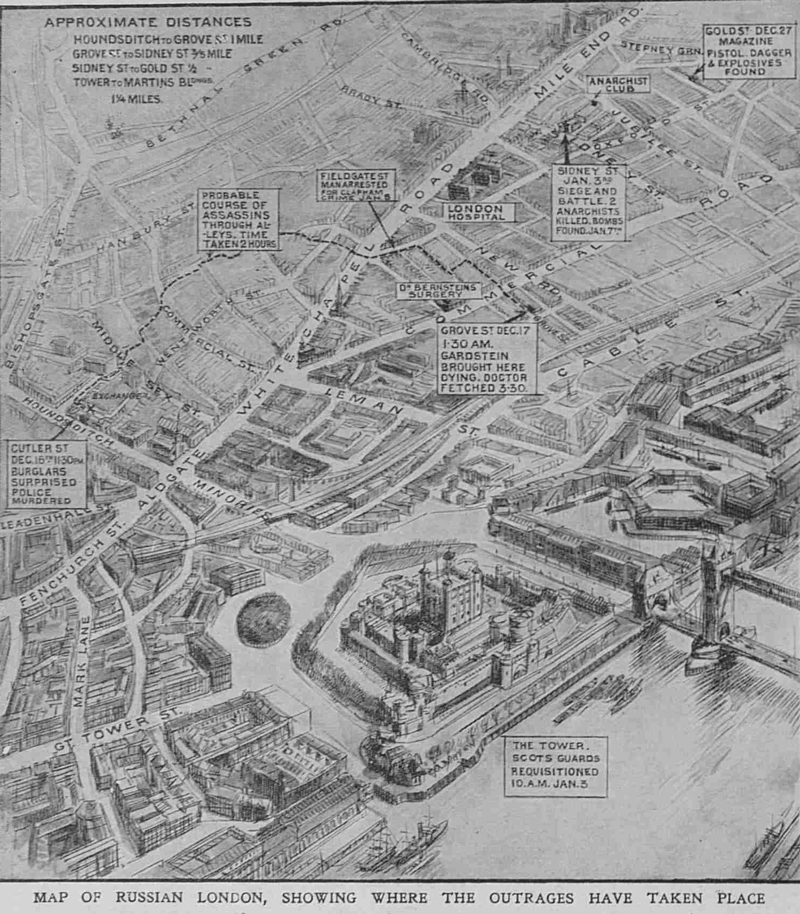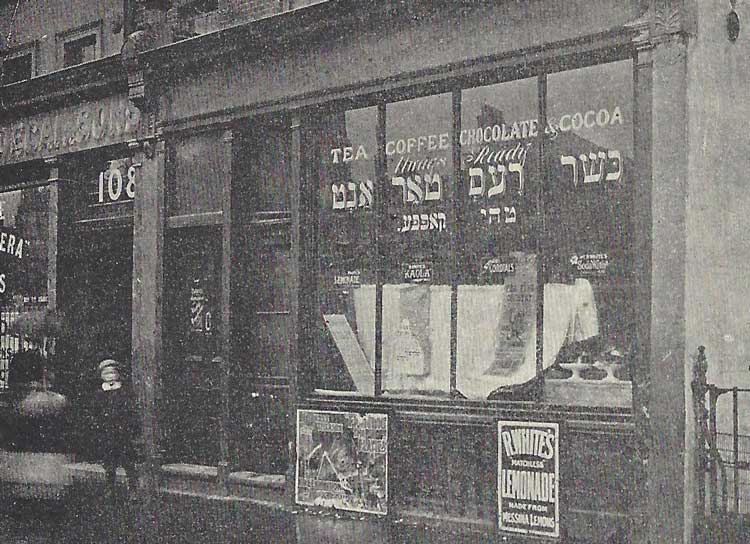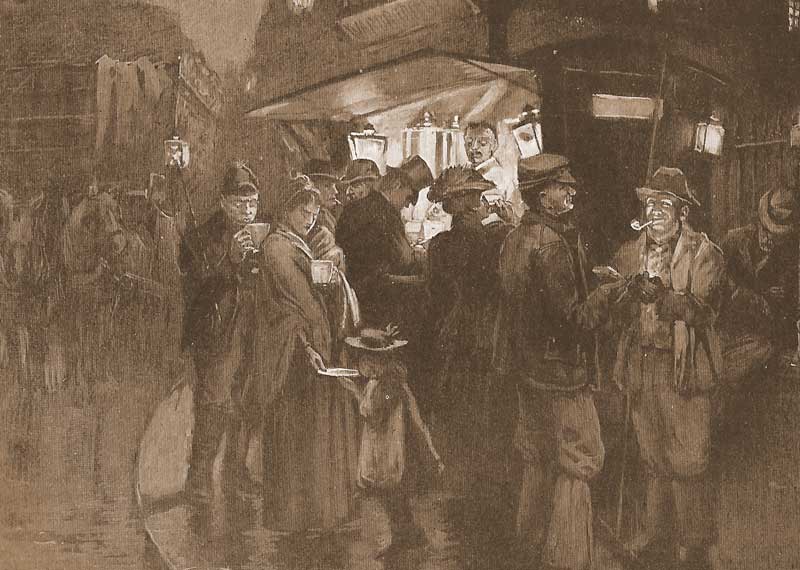In December, 1910, the people of London were shocked by the murder of three policemen in what became known as the Houndsditch murders. The murderers were a gang of anarchist Latvian immigrants.
The leader of the gang, George Gardstein, later died of injuries that he had received, and, as a result, the police, once they had identified him, were able to round up most of his accomplices.
Two remaining members of the gang remained at large until, on the 3rd of January, 1911, they were traced to a house at 100 Sidney Street, in the East End of London, and the siege of Sidney Street was soon underway.
Both the Houndsditch Murders and the Siege of Sidney Street generated a huge amount of press coverage and drew wider public attention to the large number of foreign anarchists who were residing in the East End of London, and particularly in Whitechapel.
Philip Gibbs, a journalist working for The Graphic, subsequently decided to investigate the East End’s “alien” population by spending a night in the area.
His article was published in the paper on Saturday the 14th of January, 1911.
The article featured a map, which gave readers an idea of the general layout of the streets of the area, and of the locations where the “outrages” had actually taken place.

A NIGHT DOWN EAST DESCRIBED
The article read:-
“I have spent a night in the heart of that strange realm of aliens in London out of which has come during recent days the revelation of dark and terrible tragedies, of criminal lives, of a foreign people keeping their own speech, their own secrets, and their own mysterious hiding-places, untouched by any English influence or character.
My lodging was in one of the worst streets of a quarter made infamous by its criminal reputation.
Not once, but several times, the body of a man has been found dead, with his throat cut, or a knife-wound in his heart, in one of the filthy rooms of these evil little houses.
Of course, none of the neighbours knew anything about the crime. They had heard nothing. It was not their business to know. They could not speak the English language, and it was, therefore, difficult for them to understand or to answer the police inquiries.
We have seen something of this difficulty in connection with the Houndsditch crimes. Nobody knows anything of what has happened in the next house or on the next floor!
A STRANGE WHIRRING SOUND
I stayed in that house an hour. It was full of queer noises. Immediately above my head was a strange whirring sound, which mingled with the low voices of men and women. I listened at the doorway, and guessed at last that the noise came from several sewing-machines working quickly and ceaselessly.
Once or twice the door upstairs opened, and I could hear two men speaking a foreign tongue, and two women answering querulously. Then the door was slammed violently and the murmur of voices was lower. From some other room there came the whining of a child, a pitiful wail.
These noises began to work upon my nerves.
I started violently when the staircase immediately outside creaked loudly. I had a sudden gooseflesh when my door quietly opened as though someone were about to enter. But no one came in, for it was only the wind.
A HASTY EXIT
Not for twenty pounds could I have stayed another hour in that house in which I had taken a night’s lodging.
I took up my hat and went downstairs, and every stair creaked and whined. But nobody came out into the passage of the ground floor, and it was only when I was out in the street and some yards away that I heard someone come out upon the doorstep.
I looked back.
Framed in the doorway was the dark figure of a man holding a candle. It was my burly, sullen landlord. But I hurried away with quick steps.
THE NIGHTMARE BEGINS
It was a strange night.
Looking back upon it now it seems a nightmare.
It was cold in the streets and a slushy mud was on the pavements.
I went into a little restaurant off Jubilee Street for light and warmth.
It had Hebrew letters on the window which I could not understand, and on the walls inside were pictures of Abraham and Moses, of Prince Eddy, of Johnson, the pugilist, and of the Houndsditch murderers cut from the Police Gazette.
From a young man inside I ordered a cup of coffee. When it came it was of a greenish colour, and seemed like poison. But I sipped a little for warmth’s sake while I studied the people who came in and out.
They were all foreigners, and all Jews, though of different nationalities. They came in nearly always in couples, and they sat opposite each other, with their noses very close together, whispering, or speaking in low voices, as though discussing dangerous secrets.

DIDN’T WANT TO BE OVERHEARD
And I noticed this in my night “down East,” that people nearly always went in couples, and always seemed to be afraid of having their conversation overheard.
That was curious.
I met these couples, two men, or two women, walking in dark little streets, at midnight, and as they passed they were whispering in a foreign tongue.
I saw them standing under lamp-posts down the narrow courts between the streets, and they were speaking to each other in low tones.
I stood next to them in the taprooms of public-houses, just before closing time – at 12.30 – and if they suspected for a moment that I was listening to them they stopped speaking, or put their heads close together and dropped their voices.
THE COFFEE SHOPS ON COMMERCIAL ROAD
I learnt many curious little facts about the habits of these alien people at night, when English citizens are generally in bed.
I found that many of them stay up until the early hours in the morning.
I found groups of them standing round the coffee-shops in Commercial Road and other places, which by law are the only places of refreshment allowed to remain open all night, because their business is done on the pavement and people do not enter the shop itself.
The coffee-stalls in the roadway also did a good business all through the night.
Young Jews, smartly dressed, stayed laughing and chatting here at 3 a.m. as though they were taking afternoon tea.

DANCING ALL NIGHT
These aliens are indeed very wakeful in London by night.
I passed a house with two golden lions guarding an Early Victorian gate in one of the most dismal streets in this quarter. It was brilliantly lighted in every window.
From one of them which was open came the music of a violin and piano and the stamp of feet. I could see shadows flitting swiftly across the window-blinds. People were dancing in those rooms. I passed other houses brilliantly lit also in other streets, where similar shadows were passing fantastically across the blinds.
At four in the morning, I saw a party of people leave one of these houses. They were laughing and chattering in Yiddish and other tongues.
I spoke to a policeman and asked him the meaning of this. He laughed, and said that the foreign Jews have a mania for dancing. “They will work all day and dance all night and think nothing of it,” he said. “You can’t quarrel with a people because their ways ain’t our ways.” That was his philosophy of life on the beat down East.
NOISELESS AND FURTIVE
In some of the lonely side-streets I noticed several men who came singly, and noiselessly, down the centre of the roadway – they always walked in the middle of the road – suddenly stop before little shops here and there.
One was a tobacconist’s shop, another a sweet-stuff shop, another a newspaper shop.
These places were shuttered and barred, but a light was burning in an upper room.
The men tapped at a side-door with a peculiar tattoo. In a moment or two, there was the rattle of a chain, the door creaked on its hinges. A light gleamed through a chink. Then the men passed in swiftly and the door was shut upon them.
From another policeman – one of those lonely men who were my best friends during this long night in the streets of Stepney and Whitechapel – I asked what meaning was here.
“All those places are private gambling clubs,” he said. “Now and then we make a raid on one, but you can’t stop ’em. It ain’t no use trying. And after all – as long as they don’t give trouble—” He shrugged his shoulders. That was his bit of philosophy, a shrug of the shoulders for things you cannot prevent. But he added as an after-thought, “It’s the worst kind as goes to them clubs. Very dangerous young devils. The breed of Fritz and Peter.”
AS QUIET AS DEATH
At three, four and five in the morning I saw solitary figures passing down streets as quiet as death, except now and then when, as once, I heard a shriek ring out into the silence from some upper room, and once the noise of breaking glass which seemed to shatter the peace of night.
Most of the lonely figures were, curiously enough, young girls, well dressed, who walked swiftly from lamppost to lamp-post until they stopped at dark doorways in foul little houses and let themselves in with latch-keys.
But here and there came the slinking figure of a man, with a soft hat or cloth cap slouched over his eyes.
Each one of them gave me a suspicious glance as he passed me.
One of them, when I turned a corner, started back and dived into a dark court.
Two of them walking together stared back at me, stopped in the centre of the roadway, and whispered.
It was I this time who hurried away down another turning.
THE COMING OF THE MORNING
I was glad when the working-hours came again and the rumble of the country carts coming from Essex to Covent Garden gave a cheerfulness to the Commercial Road.
I was glad when my night was over in those mean streets where until the small hours there was a gleam of light through holes cut into the shutters which boarded up their windows, and where I was filled always with a sense of the mystery, the misery, and the dark unknown ways of this little world.
GOOD COVER FOR DARK DEEDS
No doubt the imagination of the stranger is apt to exaggerate both the mystery and the misery, for many of these aliens are peaceful and hard-working people, who make excellent citizens.
But, on the other hand, I am convinced that in these streets of old and rotting houses, in these courts and alleys of Whitechapel and its surrounding parts, many criminals find good cover, and many dark deeds are done by day and night.”
